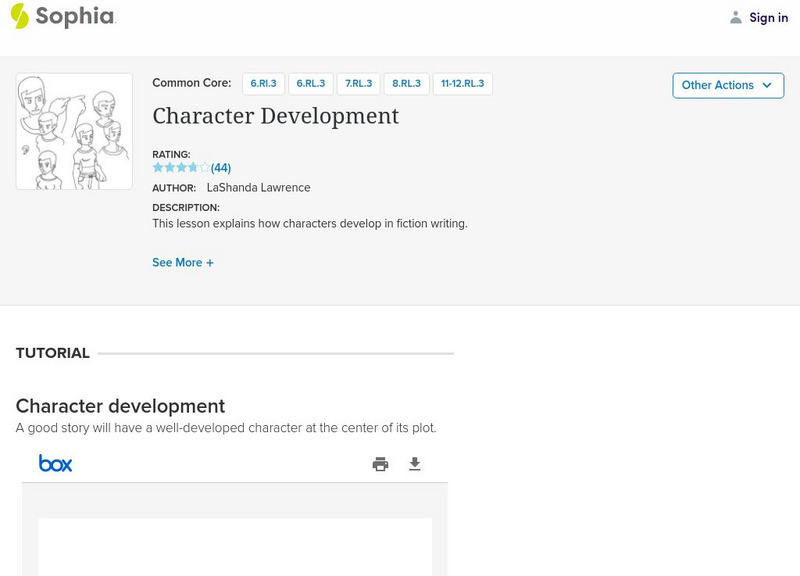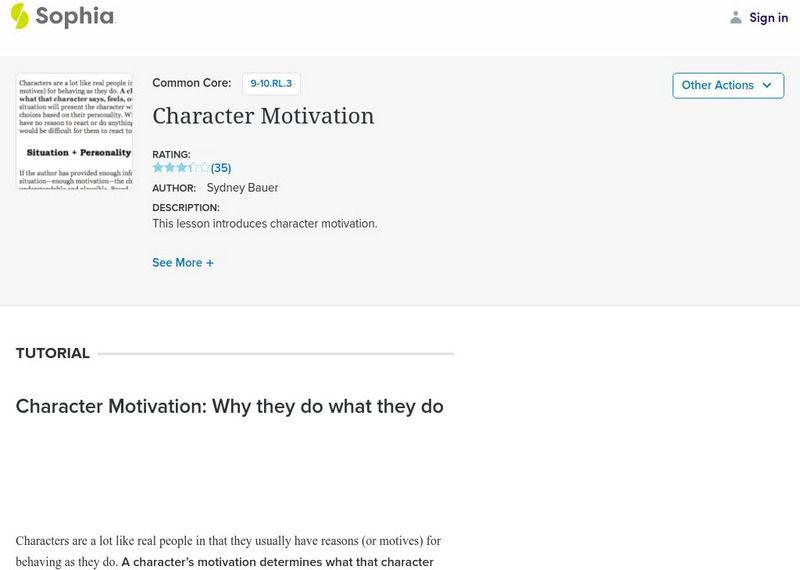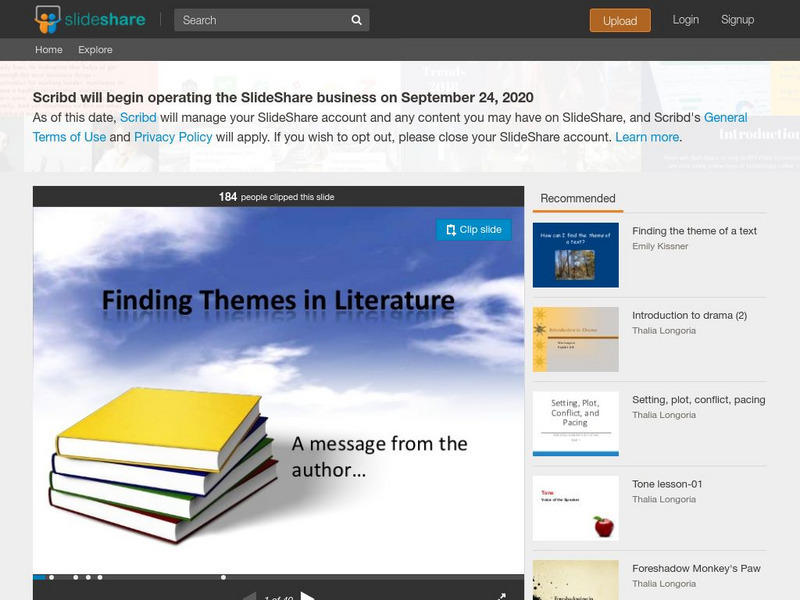Thinkport Education
Thinkport: Read Like This: Determining Theme in Literary Texts
In this module you will read a story called "The New Dress" by Virginia Woolf, with the purpose of determining themes and how they develop over the course of the text.
Thinkport Education
Thinkport: Read Like This: A Strategy for Analyzing Literary Nonfiction
Read, analyze and answer text-dependent questions about several excerpts from a famous slave narrative called The Interesting Narrative of the Life of Olaudah Equiano.
Texas Education Agency
Texas Gateway: Write Literary Text That Develops Interesting Characters
A learning module that teaches students how to write an literary text with good characterization in four lessons: Introduction, Two Types of Characterization and Two Types of Characters, Choosing Your Characters, and Your Turn.
Texas Education Agency
Texas Gateway: Writing Literary Text With an Engaging Story Line
A learning module that teaches students how to write an engaging literary text in six lessons: Introduction, The Narrative Hook, Setting, Conflict, Plot, and Ending.
Texas Education Agency
Texas Gateway:writing an Engaging Story With Literary Strategies to Enhance Plot
A learning module that teaches students about writing a short story with a strong plot in seven mini-lessons: Introduction, Choose the Point of View, Figure Out What to Say, Suspend Readers in Midair, Write about a Central Theme, Read A...
Houghton Mifflin Harcourt
Holt, Rinehart and Winston: Writer's Model: Literary Analysis Example 2
This seven-page essay provides an example of a literary analysis essay (using "Things Fall Apart"). Clicking on the "Writer's Guide" link in the upper right-hand corner of the page enables the user to get tips, directions, and...
City University of New York
Cuny Brooklyn: Literary Terms
Site gives definitions of many literary terms including "characterization."
Ted Nellen
Cyber English (By Ted Nellen): Characterization
This is a glossary entry for the term "Characterization" including a definition and the characteristics to be developed: Character's appearance, actions, thoughts, voice, and reaction from others.
Online Writing Lab at Purdue University
Purdue University Owl: Fiction Writing Basics
This resource discusses some terms and techniques that are useful to the beginning and intermediate fiction writer, and to instructors who are teaching fiction at these levels. W.11-12.3a Narratives
Yale University
Yale University: Elements of the Short Story
This unit from the Yale University on elements of the short story is designed to develop student comprehension skills, particularly making inferences and generalizing. It also involves students in reading a number of short stories to...
Writing Fix
Writing Fix: Creating a Second Person Choice Story
This lesson is designed to help students understand plot dimensions and literary devices while writing a multi-faceted short story that has many possible outcomes. For inspiration, students will analyze songs that tell stories for both...
Other
Mo Dept. Of Ed.: Analyzing and Evaluating Literary Works
Lesson plan designed for eleventh graders. Students analyze and evaluate a short story for elements of literary works such as theme, mood, word choice, imagery, tone, and main idea. Includes a student handout and a scoring guide. It...
Other
Brock University: Elements of Structuralism
Excellent overview of this literary theory and its influence. Provides connection to literature and accessible explanations for students.
BBC
Bbc Bitesize: Higher English
This site provides information about characters, plot, and setting of several different pieces of literature. It offers links to activities and tests on topic such as analysis and evaluation, creation and production, drama, novels, and...
University of Victoria (Canada)
The U Vic Writer's Guide: Literary Term: Plot
This page offers a detailed overview of plot, including its various aspects and use in various types of literary works.
Houghton Mifflin Harcourt
Holt, Rinehart and Winston: Elements of Literature: Narrator Chart [Pdf]
Provides an overview of the importance of a narrator in a text and some brief exercises for analysis. Helps students learn more about the role of the narrator in literature, his/her voice, and influence on other characters and events.
University of Victoria (Canada)
The U Vic Writer's Guide: Literary Term: Character and Characterization
This site from The UVic Writer's Guide provides an excellent overview of character and characterization. Content also explores flat and round characters. RL.9-10.3 Analyzing Characters.
ReadWriteThink
Read Write Think: Exploring Perspective in Narrative
Interactive lesson which allows learners to determine the perspective or point of view of a story character by imagining actually spending a day in their "shoes." Based on Atticus's statement in "To Kill a Mockingbird." W.11-12.3, 3a,...
Sophia Learning
Sophia: Character Development
This lesson explains how characters develop in fiction writing. W.11-12.3d Sensory/precise lang narratives
TES Global
Tes: Character Analysis
[Free Registration/Login Required] A downloadable graphic organizer for analyzing a character is provided on this page.
Caro Clarke
Caro Clarke: What Is Conflict?
This is the sixth in a series of articles designed to help the new writer with their novel. This article focuses on conflict and how it effects the characters and the plot of the story. W.11-12.3a Narratives
Tom Richey
Slide Share: Finding Themes in Literature
A slide show with forty slides with explanations, examples, and information on how to determine the theme of a text. RL.9-10.2 and RL.11-12.2 Analyzing Theme.
Other
Wastholm Media: Aphorisms Galore
This site from Wastholm Media gives numerous examples of aphorisms. They are Organized by theme and author.


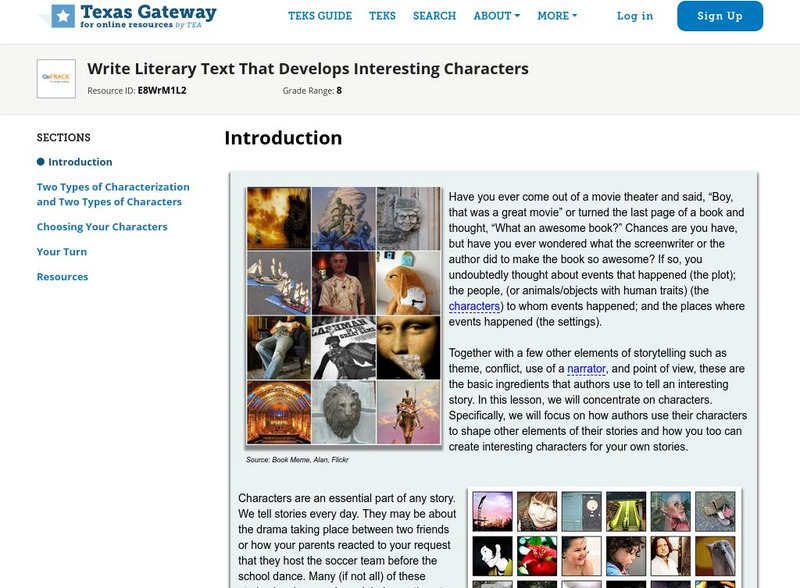
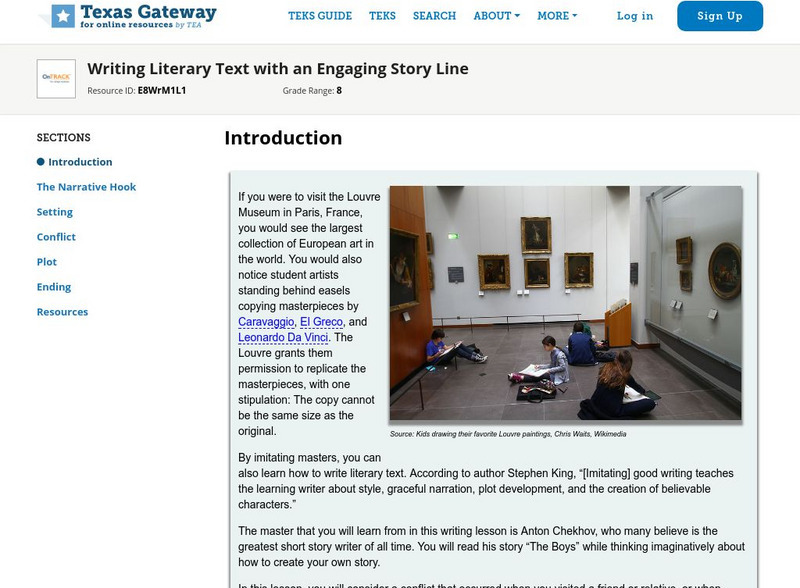





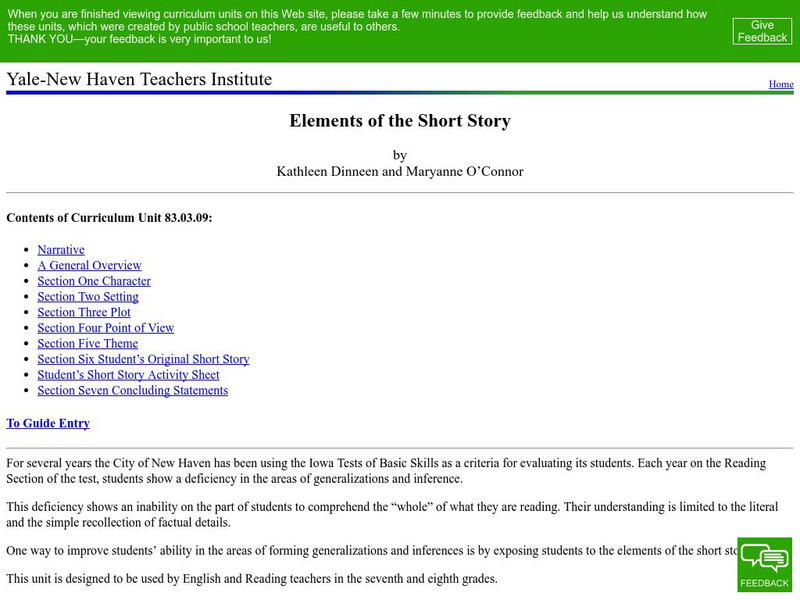


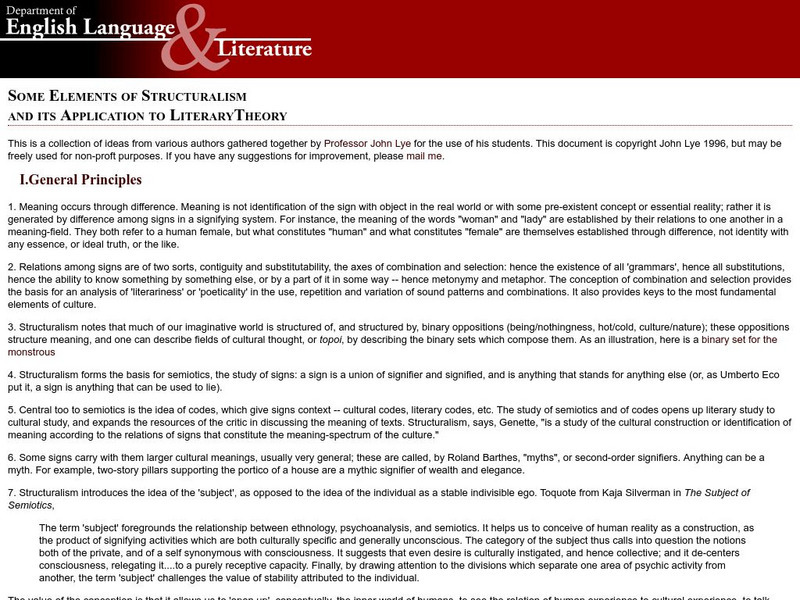


![Holt, Rinehart and Winston: Elements of Literature: Narrator Chart [Pdf] Graphic Holt, Rinehart and Winston: Elements of Literature: Narrator Chart [Pdf] Graphic](http://lessonplanet.com/content/resources/thumbnails/410058/large/bwluav9tywdpy2symdiwmduymc03nzcylxblamtwbi5qcgc.jpg?1589985144)


